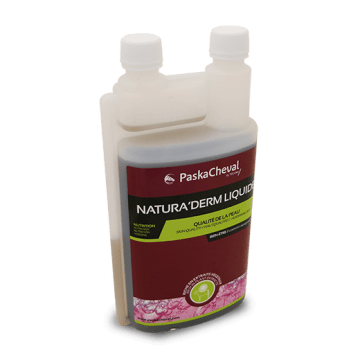In one out of ten equines, the start of spring coincides each year with the return of a chronic inflammatory skin disease: dermatitis. Hidden behind this seasonal disease, also known as Summer Seasonal Recurrent Dermatitis or SSRD, is an allergic reaction. It causes intense itching in horses.
What is Sweet Itch?
Sweet Itch is one of the most common skin conditions in horses. It reappears every year in good weather due to the presence of biting insects, especially midges of the genus Culicoides, which are particularly active outdoors between April and October, when temperatures range between 15 and 35°C. Saliva injected by biting insects causes a strong allergic reaction in some hypersensitive equines. A vicious circle then sets in, one of itching and an irresistible urge to scratch.
The first symptoms of dermatitis can develop in young horses, starting at the age of two, with the risk that they intensify with time, or even that the disease is expressed all year round. Although all breeds can be affected, some appear to be more predisposed because they are more hypersensitive to allergens, from a genetic and hereditary standpoint: Thoroughbred, Arabian, Friesian, Icelandic, Breton Draft, Shire, Connemara, Shetland, and Welsh. SSRD is a non-contagious condition. It’s important to know that it is impossible to eliminate this condition once it has developed.

What are the risks associated with Sweet Itch?
Sweet Itch is a condition that is also known as pruritis: it causes very severe itching in horses. Several stages of evolution can be observed. It all starts with the appearance of small red bumps and papules found in areas with insect bites. These bumps are somewhat invisible due to the hair and horsehair and they will quickly disappear because the horse will start to scratch hard. Little by little, the mane and the tail become dishevelled, bare, and the horsehairs break. The more the itching intensifies, the more lesions and wounds may appear and be at risk of becoming infected. The skin may then become thickened and wrinkled. In some areas, the hairs do not grow back. Generally, the areas that are affected the most are the base of the tail, the hindquarters, the neck and the withers.
How can Sweet Itch be prevented and treated?
There are no existing specific treatments or protocols against Sweet Itch. However, several actions are recommended to prevent the appearance of insects, as well as to relieve the horse and treat lesions locally.
In order to control insects, the first reflex is to provide horses living outdoors with an open shelter with shade, avoiding pastures found in areas that are too wet and the times of day when biting insects are the most active (17.00-23.00). To limit bites, it may be advised to equip horses with fly masks and appropriate horse blankets, and to use insect repellents and insecticides in gel or spray form. The use of supplements that help stimulate the immune system may be an asset in managing this problem.
If there are any lesions, it will be recommended to locally apply antiseptic, soothing and skin-healing products. For more pronounced cases, a veterinarian's opinion may be required and he/she may temporarily prescribe steroidal anti-inflammatory drugs (corticosteroids) or other treatments.
Although dermatitis is not a deadly or contagious disease, it is very disabling for the horse. Prevention is needed to control this chronic disease. Actions need to be taken with regard to the horse’s living situation and, in particular, to limit insect attacks and soothe the horse as much as possible if the event of itching using localised care.
Paskacheval offers several natural products to prevent and act on Sweet Itch: for example, the insect repellent Paska'fly range containing pyrethrum derived from plants or the NATURA'DERM range to help reduce allergic reactions and promote hair regrowth. Find them at your nearest distributor.
Where to find Paskacheval products?
Find your nearest sales outlet
Paskacheval is a range of plant-based feed supplements and external care products designed to enhance the performance and well-being of every horse.




